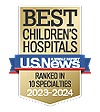 For parents dealing with a sick newborn, access to their baby’s condition needs to be clear and immediate. While conversations with the physician or nurse are a key source of information, Packard Children’s found another way to keep parents updated and in the loop.
For parents dealing with a sick newborn, access to their baby’s condition needs to be clear and immediate. While conversations with the physician or nurse are a key source of information, Packard Children’s found another way to keep parents updated and in the loop.
When the neonatal intensive care unit (NICU) switched from paper-based files to electronic medical records, it introduced a more efficient and streamlined system to maintain and share important medical information. But while digital files work well for caregivers, some parents felt they were missing out on important information.
In service to these families, a team of physicians, nurses, parents, and informatics specialists designed a template that is printed out each morning and placed by the baby’s bedside. The printout, called Your Baby’s Daily Update, provides a personalized snapshot of the electronic medical record, such as the names of the care team, lab results, nutritional status, and any changes over the past 24 hours. The printout has room at the bottom for the nurse or physician to leave a hand-written update or personal note.
“The team had a good sense of what needed to be included on the printouts based on what parents wanted to know about their child each day,” says Jonathan P. Palma, MD, MS, a neonatologist and member of Packard Children’s medical informatics services. “The Update empowers parents with the knowledge to contribute to medical decision-making regarding their infant and creates a meaningful connection.”
Since it was introduced in 2010, the Update has been translated into Spanish and the distribution process has been expanded and streamlined.
“The Update includes all the basics that a parent wants to know and is a starting point for more in-depth conversations,” says Heather Keller, a parent lead in the Department of Family-Centered Care and a member of the team that developed the project. “It’s also a wonderful tool for parents new to the NICU who face a tremendous learning curve about their child’s care and condition.”
In a survey distributed after Your Baby’s Daily Update was initiated, parents reported that they found the printout very useful, and more than 95 percent said that responded that they “always” liked receiving it and felt more competent to manage information related to the health status of their babies. Many consider the report to be “refrigerator worthy,” taking it home for display, as well as posting it on family blogs and Facebook.
The document also helps the nurses and physicians in the NICU, adds Palma. “There are a large number of patients, and we don’t always have a chance to talk to each parent every day. It’s become an important part of how we deliver care.”
Authors
- Erin Digitale
- more by this author...


 Previous
Previous







